《英语综合教程》第二册第四单元课文教学设计
综合英语(2)Unit 4 课件

blend, mix, mingle, merge, combine
Blend常用于小心地按比率混合各种东西以 求得到某种特别的味道,气味等,如: e.g. Majesty and simplicity happily ~ed together.庄严和 together.
质朴恰到好处地交融在一起 e.g. Which ~ of coffee would you like?你要哪种混合咖 啡? E.g. ~ spices 混合香料 ~ed whisky 混合威士忌
Mix 作“使混合;使混和”解时,是用于物质 方面最常用的词,如: e.g. Mix butter, eggs, and flour. e.g. The workmen ~ed sand, gravel, and cement to make concrete. e.g. His wife ~ed him a hot drink of milk, sugar and chocolate.他妻子为他调制了一杯牛奶,糖和巧 克力热饮
Vocabulary
slide, slip, glide, coast, skid, slither These verbs mean to move smoothly and continuously over or as if over a slippery surface. Slide usually implies rapid, easy movement without loss of contact with the surface: e.g. The drops slid from a lifted oar. 水滴从抬起的桨上滑下来。
Key structures
There + be Present and past participle used as a modifier of a noun (not) as/so…as… As if clause in which the subjunctive is used
unit4-全新版大学英语(第二版)综合教程2电子教案
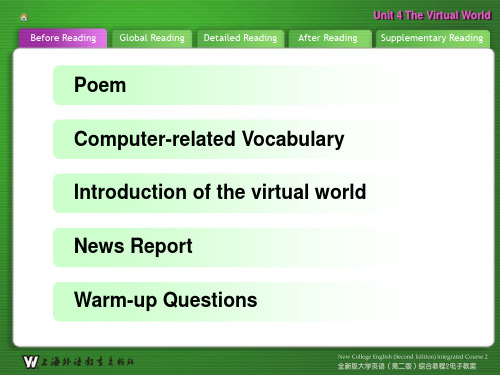
Unit 4 The Virtual World Unit 4 The Virtual World
Before Reading Global Reading Detailed Reading After Reading Supplementary Reading
Some virtual colleges are: APCO Virtual College, Virtual College of Elizabeth City State University
Introduction of the Virtual World Some Famous Websites
Detailed Reading
SOHO — Small-Office/Home-Office
Virtual College
Unit 4 The Virtual World Unit 4 The Virtual World
Detailed Reading
Unit 4 The Virtual World Unit 4 The Virtual World
Before Reading Global Reading Detailed Reading After Reading Supplementary Reading
Detailed Reading
Detailed Reading
1. What was the hero doing when his boss came in?
Surfing the Internet. 2. How did he act in front of his boss? He pretended to be surprised at the computer which had crashed “unexpectedly”. 3. What would you do if you were in such a situation? Open ended.
全新版大学英语综合教程第二册教案Unit4
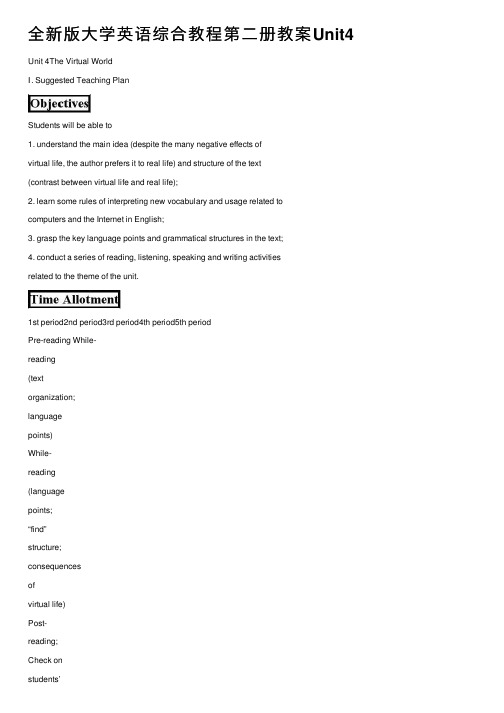
全新版⼤学英语综合教程第⼆册教案Unit4 Unit 4The Virtual WorldⅠ. Suggested Teaching PlanStudents will be able to1. understand the main idea (despite the many negative effects ofvirtual life, the author prefers it to real life) and structure of the text(contrast between virtual life and real life);2. learn some rules of interpreting new vocabulary and usage related tocomputers and the Internet in English;3. grasp the key language points and grammatical structures in the text;4. conduct a series of reading, listening, speaking and writing activitiesrelated to the theme of the unit.1st period2nd period3rd period4th period5th periodPre-reading While-reading(textorganization;languagepoints)While-reading(languagepoints;“find”structure;consequencesofvirtual life)Post-reading;Check onstudents’homereading(Text B)Theme-RelatedLanguageLearn-ing Tasks1. T asks Ss the following questions on the poem Surfing the Internet:(5minutes)* What was the hero doing when his boss came in? (surfing the Internet) * How did he act in front of his boss? (He pretended to be surprised at the computer which had crashed “unexpectedly”.)2. Ss look at the theme of this unit (The Virtual World) and the title of TextA (A Virtual Life), then try to: (10 minutes)* find antonyms of “virtual world” and “virtual life”; (real world, real life) * suggest synonyms for “virtual world”; (cyberspace, cyberia, etherworld, virtual reality, Internet world, net world, etc.)* say what people can do on the Internet, (communicating with people, shopping, reading, entertainment, education, working, hacking, publishing, etc.)3. Imaginative writing(28 minutes)1) T dictates to Ss the following paragraph:For the past two weeks, other participants of the Net Survival Contest (⽹络⽣存竞赛)and I have been shut up in bare hotel rooms.Our only link to the real world has been a computer that is hooked up to the Internet (联⽹电脑). We have relied on it, not only for food, bed sheets and other daily necessities, but also to set up an e-business (电⼦商务)of our own.2) Now Ss will complete the next paragraph beginning with: “Now it istime for me to walk out into the light of day again...” They willgive their imagination full play. They will write no more than 100words.3) Ss form groups of four to five, and read aloud to each other theirown writings.4) T asks some groups to recommend the best piece in their group tothe class.4. T may lead in to Text A by saying: Some of us like to live a life in contact with real things and real people, but others favora virtual existence. Which life is better? I’m sure you have different opinions. Now let’s read Text A to find out what Maia Szalavitz has to say about these two life styles. (2 minutes)1. Text organization (15 minutes)1) T draws Ss’ attention to Text Organization Exercise 1, and lets themread its instructions as well as what has already been done for them in this exercise.2) Ss try to complete the exercise by simply reading the first sentence ofeach paragraph in Text A.1) Ss compare answers with each other; if necessary, T may help.2. T explains the key language points and gives Ss practice (see LanguageStudy). (45 minutes)3. T guides Ss through Structure Exercise 2. (10 minutes)2. Ss re-read Paras 4-10, work in pairs to find out consequences of “my”virtual life. Can they use the “find oneself + adj./ past participle/present participle” structure when summing up the conse-quences? (10 minutes)3. Some pairs report to the class their findings, using the “find” structure.(5 minutes)1. Computer-related vocabulary items (20 minutes)1) Ss scan Text A to find out vocabulary items related to computer andthe Internet. (They are: virtual life, the net, telecommuter, email,Internet mailing lists, computer-assisted, data, link, cyber-interaction, on line, system crash, click on the modem, connection,password)2) T tells Ss that new terms related to computer and the Internet areconstantly added to the English vocabulary, so much so that many ofthem are not included in any English dictionary. However, if weapply certain rules, their meanings are easy to deduce.3) T gives Ss more examples of computer-related vocabulary items (seeText Analysis).2. T guides Ss through some after-text exercises. (25 minutes)3. T checks on Ss’ home reading (Text B). (3 minutes)4. Ss do Part IV: Theme-Related Language Learning Tasks. (1 period)5. T asks Ss to prepare the next unit: (2 minutes)1) do the pre-reading task;2) preview Text A.Ⅱ.Text AnalysisThe most dynamic combining forms/prefixes for new computer-and-Internet-related vocabulary in English are cyber-, virtual, Net- (net-), Web-(web-), and E- (e-).New English vocabulary items derived from them usually appear in the following forms:1. combining forms/prefixes + noun: this is the most common type, e.g.virtual life (虚拟⽣活), virtual world (虚拟世界), virtualcommunity(虚拟社区), virtual office (虚拟办公室), virtual pet (虚拟宠物),virtual reality (虚拟现实),cyber-interaction (⽹络互动),cyberculture(⽹络⽂化),cybernut (⽹⾍), cyberpet(电⼦宠物),cyberspace (⽹络空间), netwriter(发送电⼦邮件的⼈),nethead (⽹⾍), Webmaster (⽹站维护者), Web page (⽹页), website (⽹站),WebTV (⽹络电视机), E-book (电⼦书籍), E-shopper (⽹上购物者), e-card (电⼦贺卡), e(-)mail (电⼦邮件), e-journal (电⼦杂志),e-business (电⼦商务), e-cash (电⼦货币), e-commerce (电⼦商务). 2. combining forms/prefixes + verb: e.g. cybersurf (⽹络漫游), netsurf (⽹络漫游), websurf (⽹络漫游),email (发送电⼦邮件)3. words like cyber, net, etc. + suffix: e.g. cyberian (cyber + ian, ⽹络⽤户), cyberphobia (cyber + phobia, 电脑恐惧症), cybernaut (cyber +naut ⽹络⽤户), netter (net + er ⽹民), Webify (web + fy 使万维⽹化), cyberize (cyber + ize, 使联⽹).4. clipped word: cyberdoc (cyber + doctor, ⽹络医⽣), Netcast (Net +broadcast,⽹络播放), Netiquette (Net + etiquette, ⽹规), Netizen (Net+ citizen, ⽹民,), Netpreneur (Net + entrepreneur, ⽹络企业家),Webcam (Web + camera, ⽹络摄像机), Webcasting (Web + broadcasting,⽹络播放), Webliography (Web + bibliogrpahy, ⽹络书⽬), Webnomics (Web + economics, ⽹络经济), Webzine (Web +magazine, ⽹络杂志), e-tailing (electronic + retailing,电⼦零售), e-zine (electronic + magazine,电⼦杂志)Ⅲ. Cultural Notes1. the Internet: an international computer network for the exchange of information. It was originally used mainly in the academic and military worlds but has since become available to the large and increasing number of people with personal computers. Other services, e.g. the World Wide Web, are available through it.The Internet is changing our lives and a parallel universe is rapidly emerging online. Today there’s scarcely an aspect of our life that isn’t being upended by the torrent of information available on the hundreds of millions of sites crowding the Internet, not to mention its ability to keep us in constant touch with each other via electronic mail. The Internet is saving companies billions of dollars in producing goods and serving the needs of their customers. Nothing like it has been seen since the beginning of the Industrial Revolution, when power-driven machines began producing more in a day than men could turn out in nearly a year. The Internet and e-commerce are viewed as a global megatrend along the lines of the printing press, the telephone, the computer and the electricity.You would be hard pressed to name something that isn’t available on the Internet. Consider: books, health care, movie tickets, baby clothes, stocks, real estate, toys and airline tickets. American kids today are so computer savvy that it virtually ensures the United States will remain the unchallenged leader in cyberspace for the foreseeable future. Most kids use computers to play games and have email chats with friends.What’s clear is that, whether we like it or not, the Internet is an ever-growing part of our lives and there is no turning back. 2. NBC (the National Broadcasting Company): the first of the originalthree US national broadcasting companies. It was established in 1926by Radio Corporation of America as two groups of radio stations. Thefirst NBC television channel opened in 1940. The company is nowowned by General Electric. Its main offices are at Rockefeller Centerin New York.3. PBS (the Public Broadcasting Service): (in the US) a televisionsystem that broadcasts programs to an association of local stationswhich use no television advertisements and do not make a profit. Itwas established by the Public Broadcasting Act and is supported bymoney from the US Government, large companies and the public.PBS is known for the high quality of its programs.4. ABC (the American Broadcasting Company): one of the original threemajor television networks in America. It began in 1943 as the BlueNetwork of six radio stations. ABC is now owned by the Walt DisneyCompany .Ⅳ. Language Study1. virtual: 1) created and existing only in a computerExamples: I can visit a virtual store and put what I want in my basket atthe click of a mouse button.Some people spend too much time escaping from reality intothe virtual world conjured up on their computer screens.2) being or acting as what is described, but not accepted as such inname or officiallyExamples: Our deputy manager is the virtual head of the business.Now that the talks have broken down, war in the region looks like a virtual certainty.2. interpret: 1) understand (sth. said, ordered, or done)Examples: They are worried that the students might interpret the new regulation as a restriction of their rights. She interprets the dream as an unconscious desire to be young again.2) give or provide the meaning of,explainExamples: How do you interpret his refusal tosee us?This dream can be interpreted in several different ways.3) translate what is said in one language into anotherExamples: I am terribly sorry, but I don’t understand a word. Could you interpret for me?No one in the tour group spoke Spanish so we had to ask the guide to interpret.3. tone: a particular quality or intonation of the voiceExamples: From the tone of her voice I could tell she was very angry.Suddenly he laughed again, but this time with a cold, sharptone.4. stretch: (cause to) become longer, wider, etc. without breakingExamples: My working day stretches from seven in the morning toeight at night.The child stretched the rubber band to its full extent.5. submit: give (sth.) to sb. so that it may be formally considered (followed by to)Examples: You should submit your reports to the committee.I am going to submit an application for that job in Microsoft.Peter submitted his plans for the new town square to the local government.6. edit: revise or correctExamples: Jack is busy editing Shakespeare’s plays for use in schools.John didn’t finish editing the annual report until the end of lastmonth.7. email: electronic mailExamples: Young people like to keep in touch with their friends via email.I received an email from my studentyesterday.vt. send an email toExamples: I will email you the instant I get thenews.She’ll email me a question before she calls so I can think it overin advance.8. communicate: contact sb. in any way, esp. by speaking to them, writing to them or calling them (followed by with) Examples: Some young people depend heavily on email to communicate with each other.They have been divorced for years and never communicated with each other.9. the Internet: the worldwide network of computer links which allows computer users to connect with computers all over the world, and which carries electronic mailExamples: Whether we like it or not, the Internet is an ever-growing partof our lives.You can take online courses and earn your degree via theInternet whenever and wherever you want to.It’s believed the Internet was born in 1969 when twocomputers at the University of California, Los Angeles wereconnected by a 15 foot cable.10. relationship: state of being connectedExamples: What is the relationship between language and thought?The scientist had a good working relationship with his Americancolleagues.11. at times: sometimesExamples: She has been away from her home for about a year. At times she wishes she had never left. He went on listening to her, at times impatient and at times fascinated.12. take in: absorb (sth.) into the body by breathingor swallowingExamples: The earth takes in heat and light fromthe sun.Fish take in oxygen through their gills.13. data: information, usu. in the form of facts or statistics thatyou can analyzeExamples: This data is stored on the network and can beaccessed by anybody.The data is still being analyzed, so I can’t tell you the results.14. spit: send (liquid, food, etc.) out from the mouth (used in the pattern: spitsth. (out) (at/on/onto sbJsth.))Examples: The baby spat its food out on the table.He took one sip of the wine and spat it out.15. on line: connected to or controlled by a computer(network)Examples: Our system is on line to the maincomputer.The largest online institution is the University of Phoenix, withsome 1000 students today and hopes of reaching 200,000 studentsin 10 years.16. symptom: 1) sign of the existence of sth. badExamples: High interest rates are a symptom of a weak economy.They regard the increase in crime as a symptom of a more generaldecline in moral standards.2) change in the body that indicates an illnessExamples: A cold, fever and headache are the usualsymptoms of flu.If the symptoms persist, it is important to go to your doctor.17. nightmare: a terrifying dreamExamples: Tom didn’t eat fish because it gives him nightmares.Watching horror films gives menightmares.I had a nightmare about falling off theskyscraper.18. conversely: in a way that is opposite to sth.Examples: $1 will buy 100 yen worth of Japanese goods. Conversely, 100 yen will buy $1 worth of American goods. You can add the fluid to the powder or, conversely, the powder to the fluid.19. but then: yet at the same timeExamples: The failure of China’s soccer team looks inevitable. But then, anything can happen in football.Mary performed better than the others in the final exam; but then,she spent much longer on it than they did.20. jar: have a harsh or an unpleasant effect (used in the pattern: jarsth., jar on sbJsth.)Examples: You shouldn’t have too many colors in a small space as the effect can jar.The loud bang jarred my nerves.Her squeaky voice jarred on me.21. suck in: (usu. passive) involve (sb.) in an activity, an argument, etc., usu.against their will (used in the pattern: suck sb. in/into sth.; suck in)Examples: I don’t want to get sucked into the debate about school reform.Some teenagers don’t want to get involved with gangs, but theyfind themselves getting sucked in.22. keep up with: learn about or be aware of (thenews, etc.)Examples: Carrie likes to keep up with the latestfashions.He didn’t bother to keep up with the news. His only concern wasto study.23. Work moves into the background: Work becomes secondary to me.24. in sight: 1) visibleExamples: It was early in the morning and there wasn’t anyone in sight oncampus.As the train pulled into the station my parents standing on theplatform were soon in sight.2) likely to come soonExamples: Two months passed, and victory was not yetin sight.The end of the economic nightmare is still nowhere in sight.A solution to the problem of environmental pollution now seemsin sight.25. remark: thing said or written as a commentExamples: The principal of the school made some remarks about educational reform at the meeting. Mr. Smith approached us and made a couple of remarks aboutthe weather.His rude remark about my book jarred on me.26. emotional: 1) of the emotionsExamples: She is grateful to him for his emotional support while she wasin trouble.It’s quite difficult to handle emotional problems.2) having emotions that are easily excitedExamples: Marie got very emotional when we parted, andstarted to cry.It’s said that the Italians are more emotional than we are.27. cue: anything that serves as a signal about what to do or say (followedby to / for)Examples: When he started to talk about the finances, that was our cue toget up quietly and leave.When I nod my head, that’s your cue to giveflowers to him.Mr. Clinton’s excitement was the cue for acampaign.28.1 say a line: I type a line on the screen.29. routine: a fixed and regular way of doing things (oftenadjectival)Examples: The job is really just a dull series of fairly routine tasks. I don’t think you’ll take it.He established a new routine after retirement.30. rely on/upon: depend confidently on, put trust inExamples: Nowadays we rely increasingly on computers to control theflow of traffic.Some children relied heavily on the advice of theirparents.31.abuse: wrong or bad use or treatment of sth./sb.Examples: The World Health Organization (WHO) has published a report on drug abuse and addiction.The policemen are making an investigationof child abuse.32. restore: bring back to a former condition (used in the pattern: restoresth.; restore sb. to sth.)Examples: Law and order will be quickly restored after the incident.Winning three games restored their confidence.Doing sports every day restored the old man to good health.The deposed king was restored to power.33. arrange: prepare or plan (used in the pattern: arrange sth.; arrange todo sth.; arrange for sb./ sth. to do sth.)Examples: Her marriage was arranged by her parents.Let’s arrange to have a dinner together some time before wegraduate.I have arranged for a taxi to pick us up at 8:00 a.m.I could arrange for you to come along with us if you like.34. flee: run away (from) (used in the pattern: flee from/to; fleesomeplace)Examples: The customers fled from the bank when the alarmsounded.During the war, thousands upon thousands of Afghans fled the country.Up to five million political refugees have fled to other countries.35. interview: 1) a meeting at which a journalist asks sb. questions inorder to find out their newsExamples: In an exclusive interview with our reporter, the film star revealed some of his personal affairs.Radio interviews are generally more relaxed than television ones.2) a formal meeting at which sb. applying for a job is askedquestions, as a way of judging how suitable they are Examples: I have been asked to go for an interview for a project I applied for at Harvard University.She has had a couple of job interviews, but nooffers.v.Examples: As a journalist, he interviewed manygovernment officials.After the press conference, the journalist interviewed the UN Secretary General about the Israeli-Palestinian conflict.I will be interviewed next week for the Chief Executive’s job.36. appointment: an arrangement to meet or visit sb. at a particular time (followed by with)Examples: You can’t see the president of the university unless you make an appointment.I’ve made an appointment to see my tutor tomorrow.37. click: press or release a mouse button rapidly, as to select an icon (followed by on)Example: When shopping online, you just click the mouse and order what you want to buy.38. tune: a series of musical notes that is pleasant andeasy to rememberExamples: She whistled a happy tune all the wayhome.He was humming a merry tune while cooking.。
致用英语综合教程综合英语2教案综合英语2教案unit4
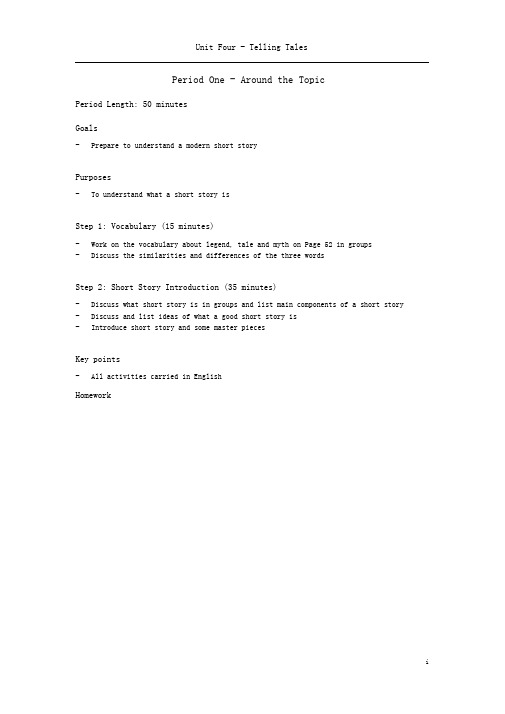
Period One - Around the TopicPeriod Length: 50 minutesGoals-Prepare to understand a modern short storyPurposes-To understand what a short story isStep 1: Vocabulary (15 minutes)-Work on the vocabulary about legend, tale and myth on Page 52 in groups-Discuss the similarities and differences of the three wordsStep 2: Short Story Introduction (35 minutes)-Discuss what short story is in groups and list main components of a short story -Discuss and list ideas of what a good short story is-Introduce short story and some master piecesKey points-All activities carried in EnglishHomeworkPeriod Two — Reading (1): Mr. JonesPeriod Length: 50 minutesGoals-Vocabulary and grammar-Discourse knowledgePurposes-Learn new words and expressions-Understand key grammar points-Understand related discourse knowledgeStep 1: Pre-reading Tasks (15 minutes)-Discuss briefly the words and the task on Page 54 in groups-Check briefly the preview results from studentsStep 2: Reading activity (Part One: 25 minutes)-Listen to the reading-Ask students to present new words and sentences in groups-Ask students to give feedbacks for the information presented-Give more explanations to the new words and sentences-Provide extra knowledge about new words-Guide more on sentences and grammarStep 3: Summarization (10 minutes)-Summarize the words and sentences-Summarize the text learntKey points-Instructions and tasks carried in English, Chinese is used only when necessaryHomework-Review the learnt sections-Preview the following parts and exercisesPeriod Length: 50 minutesGoals-Vocabulary and grammar-Discourse knowledgePurposes-Learn new words and expressions-Understand key grammar points-Understand related discourse knowledgeStep 1: Pre-reading Tasks (15 minutes)-Discuss briefly the previously learnt part for understanding-Check briefly the preview results from studentsStep 2: Reading activity (Part Two: 25 minutes)-Listen to the reading-Ask students to present new words and sentences in groups-Ask students to give feedbacks for the information presented-Give more explanations to the new words and sentences-Provide extra knowledge about new words-Guide more on sentences and grammar-Check the comprehension questions on Page 56Step 3: Summarization (10 minutes)-Summarize the words and sentences-Summarize the text learntKey points-Instructions and tasks carried in English, Chinese is used only when necessaryHomeworkReview the learnt sectionsPreview the following parts and exercisesPeriod Length: 50 minutesGoals-Enhance the vocabulary abilityPurposes-Learn detailed usage of certain words-Learn detailed usage of certain language structuresStep 1: Exercise A (15 minutes)-Work Vocabulary and Structure exercise A on Page 56 in groups -Check and compare answers in groups and negotiate them-Ask students to present their answers-Provide feedbacks for answersStep 2: Exercise B (15 minutes)-Work exercise B on Page 57 in groups-Check and compare answers in groups and negotiate them-Ask students to present their answers-Provide feedbacks for answersStep 3: Exercise C (20 minutes)-Work exercise C & D on Page 57 in groups-Check and compare answers in groups and negotiate them-Ask students to present their answers-Provide feedbacks for answersKey points-Instructions and activities be carried in EnglishHomework-Finish Writing Task on Page 58 and turn them in due next period -Prepare for the grammar and vocabulary exercisesPeriod Five Language in UsePeriod Length: 50 minutesGoals-Grammar knowledge and vocabulary buildingPurposes-Narrative Tenses-Phrasal Verbs with off and outStep 1: Narrative Tenses (30 minutes)-Test grammar knowledge on Page 59 for checking grammar abilities-Work on exercises A, B & C on Pages 59 & 60 in groups-Ask students to present their answers and provide necessary explanations -Give supplementary information on those structures if necessaryStep 2: Phrasal Verbs with off and out (20 minutes)-Work on exercises A & B on Pages 28 in groups-Ask students to present their answers and explain Compound words-Give supplementary information on Compound words if necessaryKey points-Give instructions in English-Explain grammar knowledge in ChineseHomeworkPeriod Six — Extension: The Enchanted Knife Period Length: 50 minutesGoals-Extend reading abilitiesPurposes-Apply previously learnt vocabulary and cultural knowledge in reading-Develop reading abilities-Improve abilities on negotiation and discussionStep 1: Reading (20 minutes)-Ask students to readThe Enchanted Knifeon Page 30 in groups-Understand new words and sentences within the group by negotiating in English -Finish Vocabulary Check on Page 64Step 2: Discussion (30 minutes)-Discuss questions listed on Page 64-Ask each group to present their opinions for the questions in front-Give feedbacks and remarks for presentationsKey points-Inspect group discussions and give guidance to promote discussionsHomework-Review previously learnt materials-Prepare for the ProjectPeriod Seven - Project (1): A Story of Your Own Period Length: 50 minutesGoals-Teamwork abilitiesPurposes-Apply previously learnt words and cultural knowledge into actual use-Develop teamwork abilitiesStep 1: A Make-up story (25 minutes)-Make up a strange story following the example of Mr. Jones with clue words and instructions on Page 62Step 2: An odd experience (25 minutes)-Work in groups to finish the story of An odd experience on Page 62-Ask each group to present their stories and provide remarksKey points-All preparations and negotiations be carried in English-Give guidance while students prepare the projectHomeworkPeriod Eight - Project (2): A Story of Your OwnPeriod Length: 50 minutesGoals-See abovePurposes-See aboveStep 1: Prepare for a surprise (25 minutes)-Share your stories with others and present them with pictures if possibleStep 2: Evaluate stories (25 minutes)-Give remarks to the presentations after the whole class have finished presenting stories-Group members should also talk about what they have learnt from this presentation project.Key points-Give instructions for presentationHomework-Revise writings according to the feedbacks and remarks received-Turn the revised copies before next periodPeriod Nine - Culture Tips: AthenaPeriod Length: 50 minutesGoals-Understand part of western culture from another perspectivePurposes-Help students to understand western culture-Help students to learn more cultural expressionsStep 1: Warm-up (15 minutes)-Read materials onAthena on Page 65-Help on any new words if necessaryStep 2: Open Discussion (35 minutes)-Ask students to talk more about western myths and tales if possible-Encourage students to pay more attention to the western culture while learning a languageKey points-All activities be carried in EnglishHomeworkPeriod Ten - Learning to Learn Period Length: 50 minutesGoalsPurposesStep 1Step 2Key pointsHomework。
全新版大学英语 第二册 Unit4 B2U4
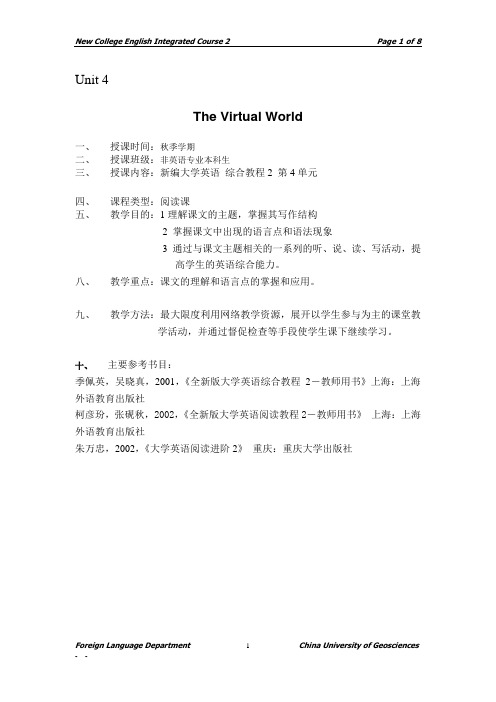
Unit 4The Virtual World一、授课时间:秋季学期二、授课班级:非英语专业本科生三、授课内容:新编大学英语综合教程2 第4单元四、课程类型:阅读课五、教学目的:1理解课文的主题,掌握其写作结构2 掌握课文中出现的语言点和语法现象3 通过与课文主题相关的一系列的听、说、读、写活动,提高学生的英语综合能力。
八、教学重点:课文的理解和语言点的掌握和应用。
九、教学方法:最大限度利用网络教学资源,展开以学生参与为主的课堂教学活动,并通过督促检查等手段使学生课下继续学习。
十、主要参考书目:季佩英,吴晓真,2001,《全新版大学英语综合教程2-教师用书》上海:上海外语教育出版社柯彦玢,张砚秋,2002,《全新版大学英语阅读教程2-教师用书》上海:上海外语教育出版社朱万忠,2002,《大学英语阅读进阶2》重庆:重庆大学出版社Unit 4 The Virtual WorldObjectives:1) Understand the main idea and structure of the text.2) Learn some rules of interpreting new vocabulary and usage related to computers and the Internet in English.3) Grasp the key language points and grammatical structures in the text.4) Conduct a series of reading, speaking and writing activities related to the theme of the unit. Time Allocation and Course Arrangement:Pre-reading Tasks: (50 minutes)1. Warming-up exercise: Deliver handout about the introduction of Internet and ask concerned questions for Ss to discuss first and then answer them. (15’)2. Do the pre-reading task on pp.100. (10’)3. Listen to the recording twice and then discuss the following questions with your partner. (15’)1) Is the hero a student or an employee?2) What was he doing when the boss came in?3) How did he act in front of his boss?4. Ask Ss to find antonyms of “virtual world” and “virtual life” in the text. (10’)While-reading Tasks: (40 minutes)1. Ss are asked to skim the text and then do the Text Organization Exercise on page 107. (15’)2. Detail ed Reading: Ss discuss the following questions and report to the class (30’)1) Question for Paragraph 1What does the author feel after too long on the Net?2) Questions for Paragraph 2-3What did the author do three years ago and what is she doing now?How does the author manage her daily life?3) Questions for Paragraph 4-10What are the symptoms shared by people who live a virtual life?How does the author behave when she is suddenly confronted with real live humans?How does the author behave on line? Why?4) Questions for Paragraph 11-12What does the author do in order to return to the real world?Does she feel happy doing so?5) Question for paragraph 13When dissatisfied with the real world, what does the author do?Homework:1. Deliver handouts about language points and ask Ss to review them after class.2. Finish exercises of unit 1.3. Finish reading Text B.4. Ss prepare for follow-up discussion: The pros and cons of InternetAfter-reading Tasks: (90 minutes)1. Group discussion on the pros and cons of Internet. (30’)2. The presentation of each group. (20’)3. Check on Ss’ homework. (20’)4. Test of Unit 3. (10’)II. Language Study1. virtual: 1) created and existing only in a computerExamples: I can visit a virtual store and put what I want in my basket at the click of a mouse button.Some people spend too much time escaping from reality into the virtual worldconjured up on their computer screens.2) being or acting as what is described, but not accepted as such in name or officially Examples: Our deputy manager is the virtual head of the business.Now that the talks have broken down, war in the region looks like a virtual certainty.2. interpret: 1) understand (sth. said, ordered, or done)Examples: They are worried that the students might interpret the new regulation as a restriction of their rights.She interprets the dream as an unconscious desire to be young again.2) give or provide the meaning of, explainExamples: How do you interpret his refusal to see us?This dream can be interpreted in several different ways.3) translate what is said in one language into anotherExamples: I am terribly sorry, but I don't understand a word. Could you interpret for me?No one in the tour group spoke Spanish so we had to ask the guide to interpret.3. tone: a particular quality or intonation of the voiceExamples: From the tone of her voice I could tell she was very angry.Suddenly he laughed again, but this time with a cold, sharp tone.4. stretch: (cause to) become longer, wider, etc. without breakingExamples: My working day stretches from seven in the morning to eight at night.The child stretched the rubber band to its full extent.5. submit: give (sth.) to sb. so that it may be formally considered (followed by to)Examples: You should submit your reports to the committee.I am going to submit an application for that job in Microsoft.Peter submitted his plans for the new town square to the local government.6. edit: revise or correctExamples: Jack is busy editing Shakespeare's plays for use in schools.John didn't finish editing the annual report until the end of last month.7. email: electronic mailExamples: Young people like to keep in touch with their friends via email.I received an email from my student yesterday.vt. send an email toExamples: I will email you the instant I get the news.She'll email me a question before she calls so I can think it over in advance.8. communicate: contact sb. in any way, esp. by speaking to them, writing to them or callingthem (followed by with)Examples: Some young people depend heavily on email to communicate with each other.They have been divorced for years and never communicated with each other.9. the Internet: the worldwide network of computer links which allows computer users to connectwith computers all over the world, and which carries electronic mail Examples: Whether we like it or not, the Internet is an ever-growing part of our lives.You can take online courses and earn your degree via the Internet whenever andwherever you want to.It's believed the Internet was born in 1969 when two computers at the Universityof California, Los Angles were connected by a 15 foot cable.10. relationship: state of being connectedExamples: What is the relationship between language and thought?The scientist had a good working relationship with his American colleagues. 11. at times: sometimesExamples: She has been away from her home for about a year. At times she wishes she hadnever left.He went on listening to her, at times impatient and at times fascinated.12. take in: absorb (sth.) into the body by breathing or swallowingExamples: The earth takes in heat and light from the sun.Fish take in oxygen through their gills.13. data: information, usu. in the form of facts or statistics that you can analyzeExamples: This data is stored on the network and can be accessed by anybody.The data is still being analyzed, so I can't tell you the results.14. spit: send (liquid, food, etc.) out from the mouth (used in the pattern: spit sth. (out) (at/on/ontosb./sth.))Examples: The baby spat its food out on the table.He took one sip of the wine and spat it out.15. on line: connected to or controlled by a computer (network)Examples: Our system is on line to the main computer.The largest online institution is the University of Phoenix, with some 1000 studentstoday and hopes of reaching 200,000 students in 10 years.16. symptom: 1) sign of the existence of sth. badExamples: High interest rates are a symptom of a weak economy.They regard the increase in crime as a symptom of a more general decline in moralstandards.2) change in the body that indicates an illnessExamples: A cold, fever and headache are the usual symptoms of flu.If the symptoms persist, it is important to go to your doctor.17. nightmare: a terrifying dreamExamples: Tom didn't eat fish because it gives him nightmares.Watching horror films gives me nightmares.I had a nightmare about falling off the skyscraper.18. conversely: in a way that is opposite to sth.Examples: $1 will buy 100 yen worth of Japanese goods. Conversely, 100 yen will buy $1 worth of American goods.You can add the fluid to the powder or, conversely, the powder to the fluid.19. but then: yet at the same timeExamples: The failure of China's soccer team looks inevitable. But then, anything can happen in football.Mary performed better than the others in the final exam; but then, she spent muchlonger on it than they did.20. jar: have a harsh or an unpleasant effect (used in the pattern: jar sth., jar on sb./sth.)Examples: You shouldn't have too many colors in a small space as the effect can jar.The loud bang jarred my nerves.Her squeaky voice jarred on me.21. suck in: (usu. passive) involve (sb.) in an activity, an argument, etc., usu. against their will(used in the pattern: suck sb. in/into sth.; suck in )Examples: I don't want to get sucked into the debate about school reform.Some teenagers don't want to get involved with gangs, but they find themselvesgetting sucked in.22. keep up with: learn about or be aware of (the news, etc.)Examples: Carrie likes to keep up with the latest fashions.He didn't bother to keep up with the news. His only concern was to study.23. Work moves into the background: Work becomes secondary to me.24. in sight: 1)visibleExamples: It was early in the morning and there wasn't anyone in sight on campus.As the train pulled into the station my parents standing on the platform were soonin sight.2) likely to come soonExamples: Two months passed, and victory was not yet in sight. ,The end of the economic nightmare is still nowhere in sight.A solution to the problem of environmental pollution now seems in sight.25. remark: thing said or written as a commentExamples: The principal of the school made some remarks about educational reform at the meeting.Mr. Smith approached us and made a couple of remarks about the weather.His rude remark about my book jarred on me.26. emotional: 1) of the emotionsExamples: She is grateful to him for his emotional support while she was in trouble.It's quite difficult to handle emotional problems.2) having emotions that are easily excitedExamples: Marie got very emotional when we parted, and started to cry.It's said that the Italians are more emotional than we are.27. cue: anything that serves as a signal about what to do or say (followed by to/for)Examples: When he started to talk about the finances, that was our cue to get up quietly and leave.When I nod my head, that's your cue to give flowers to him.Mr. Clinton's excitement was the cue for a campaign.28. I say a line: I type a line on the screen.29. routine: a fixed and regular way of doing things (often adjectival)Examples: The job is really just a dull series of fairly routine tasks. I don't think you'll take it.He established a new routine after retirement.30. rely on/upon: depend confidently on, put trust inExamples: Nowadays we rely increasingly on computers to control the flow of traffic.Some children relied heavily on the advice of their parents.31. abuse: wrong or bad use or treatment of sth./sb.Examples: The World Health Organization (WHO) has published a report on drug abuse and addiction.The policemen are making an investigation of child abuse.32. restore: bring back to a former condition (used in the pattern: restore sth.; restore sb. to sth.)Examples: Law and order will be quickly restored after the incident.Winning three games restored their confidence.Doing sports every day restored the old man to good health.The deposed king was restored to power.33. arrange: prepare or plan (used in the pattern: arrange sth.; arrange to do sth.; arrange for sb./sth. to do sth.)Example: Her marriage was arranged by her parents.Let% arrange to have a dinner together some time before we graduate.I have arranged for a taxi to pick us up at 8:00 a.m.I could arrange for you to come along with us if you like.34. flee: run away (from) (used in the pattern: flee from/to; flee someplace)Examples: The customers fled from the bank when the alarm sounded.During the war, thousands upon thousands of Afghans fled the country.Up to five million political refugees have fled to other countries.35. interview: 1) a meeting at which a journalist asks sb. questions in order to find out their newsExamples: In an exclusive interview with our reporter, the film star revealed some of his personal affairs.Radio interviews are generally more relaxed than television ones.2) a formal meeting at which sb. applying for a job is asked questions, as a way ofjudging how suitable they areExamples: I have been asked to go for an interview for a project I applied for at Harvard University.She has had a couple of job interviews, but no offers.v.Examples: As a journalist, he interviewed many government officials.After the press conference, the journalist interviewed the UN Secretary Generalabout the Israeli-Palestinian conflict.I will be interviewed next week for the Chief Executive's job.36. appointment: an arrangement to meet or visit sb. at a particular time (followed by with)Examples: You can't see the president of the university unless you make an appointment.I've made an appointment to see my tutor tomorrow.37. click: press or release a mouse button rapidly, as to select an icon (followed by on)Example: When shopping online, you just click the mouse and order what you want to buy.38. tune: a series of musical notes that is pleasant and easy to rememberExamples: She whistled a happy tune all the way home.He was humming a merry tune while cooking.. Homework:1.Recite the words and phrases of this unit.2.Finish doing the exercises.3.Preview Unit 5。
全新版大学英语综合教程2第二版Unit4电子ppt课件
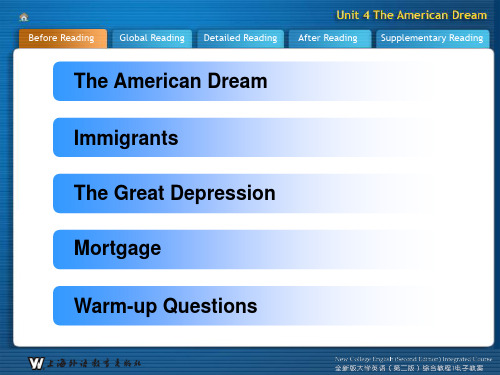
Global Reading Detailed Reading After Reading Supplementary Reading
The American Dream
Immigrants The Great Depression
Mortgage
Warm-up Questions
American Dream is the belief that everyone in the United States has the chance to achieve success and prosperity. For ordinary people, it means a happy family, an ideal job, and a nice house. For minorities and immigrants, it also includes freedom and equal rights.
Introduction
Listen to the passage and fill in the blanks with the missing words.
Before Reading
Global Reading Detailed Reading After Reading Supplementary Reading
Before Reading
Global Reading Detailed Reading After Reading Supplementary Reading
The Great Depression
Before Reading
Global Reading Detailed Reading After Reading Supplementary Reading
全新版大学英语综合教程2第二版Unit4电子ppt课件

Before Reading
Global Reading Detailed Reading After Reading Supplementary Reading
Further Understanding
For Part 1
Table Completion Matching Scanning
Part Division of the Text Further Understanding
Before Reading
Global Reading Detailed Reading After Reading Supplementary Reading
Part Division of the Text
American Dream is the belief that everyone in the United States has the chance to achieve success and prosperity. For ordinary people, it means a happy family, an ideal job, and a nice house. For minorities and immigrants, it also includes freedom and equal rights.
本人致力于施工十年多的时间主要工作是协助领导做好施工现场的监理工作
Before Reading
Global Reading Detailed Reading After Reading Supplementary Reading
The American Dream
Immigrants The Great Depression
新世纪大学英语综合教程2unit4课文详解

新世纪大学英语综合教程2unit4课文详解Text B积极思维的威力:幸福生活的秘诀雷米兹·萨松积极思维就是将有利于成长、发展和成功的想法、话语和图像纳入大脑之中。
积极思维就是期待良好与顺利的结果。
积极思维的头脑期待幸福、愉悦与健康,还有在任何情况与行动中都会有成功的结局。
大脑希望有什么,就能找到什么。
并不是每个人都会接受或相信积极思维的好处。
有些人会认为这样的话题完全是一派胡言,另外的人对相信和接受积极思维的人嗤之以鼻。
而那些熟悉这个话题的人中,知道如何有效地行动而达到理想结果的也不算多。
不过,关注这个话题的人似乎越来越多,相关书籍、讲座和课程越来越多,就是明证。
这个话题已越来越流行。
常听人们对那些情绪低落而焦躁的人说:“想开点!”绝大多数人不把这样的话当回事儿,因为他们不知道这话的真实含义,或者觉得它并不实用。
试问,在你认识的人当中,有多少人曾经停下来思考过积极思维的威力到底意味着什么呢?阿伦申请了一份新工作,但他对自己评价很低,认为自己是个失败者,没有成功的资本,因此肯定自己不可能得到这份工作。
他对自己的想法是消极的,相信其他的应聘者比他好,比他更有资格。
阿伦有这样的想法是因为他之前申请过的工作大多都没有成功,因此会有消极的体验。
面试前的整整一个星期,他的脑子中都充满着关于那份工作的消极想法和恐惧。
他肯定自己不会被录取。
面试那天,他睡过头了,然后惊恐地发现他打算穿的衬衫竟是脏的,而另外一件还要熨烫。
因为已经来不及了,所以他穿着皱巴巴的衬衫就出门了。
面试过程中他很紧张,表现得很消极,顾虑着他的衬衫,再加上没时间吃早餐已经是饥肠辘辘。
所有这一切都让他分心,让他很难把精神集中在面试上。
他的整体表现给面试官留下了极坏的印象,结果他的恐惧就变成了现实,没有得到这份工作。
吉姆也申请了同一份工作,但他对此事的态度截然不同。
他很肯定自己会得到这个工作。
面试前的一个星期里,他经常想象自己给面试官留下好印象,并得到这份工作。
新世纪高职高专英语(修订版)综合教程第二册电子教案Unit4
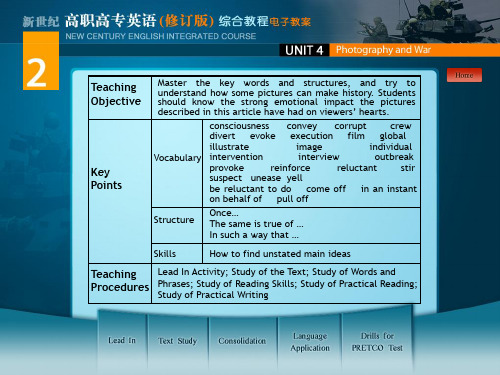
Middle East Conflict
The conflict in the Middle East refers to the violent clashes between Israel and the Palestinians supported by many Arab countries. The conflict has been going on and off for the past 55 to 60 years. Since its establishment as a state in 1948, Israel has fought four major wars with its neighbors in 1948, 1956, 1967 and 1973, as well as an 18-year war against Arab guerrillas in southern Lebanon.
A prolonged war (1954--1975) between the army of North Vietnam and the armies of South Vietnam and the United States. By the end of 1965, 180,000 US troops were fighting in Vietnam and the number reached its peak of 540,000 by 1969. The US felt that their superior weapons and military technology would easily overwhelm the North Vietnam army, which relied on guerrilla tactics perfected over centuries and had the growing support of the Vietnamese people. Ultimately, however, the United States failed to achieve its goal. Viet Nam was reunified and in 1976 it officially became the Socialist Republic of Vietnam.
新外研版高中英语必修第二册Unit 4 教学设计
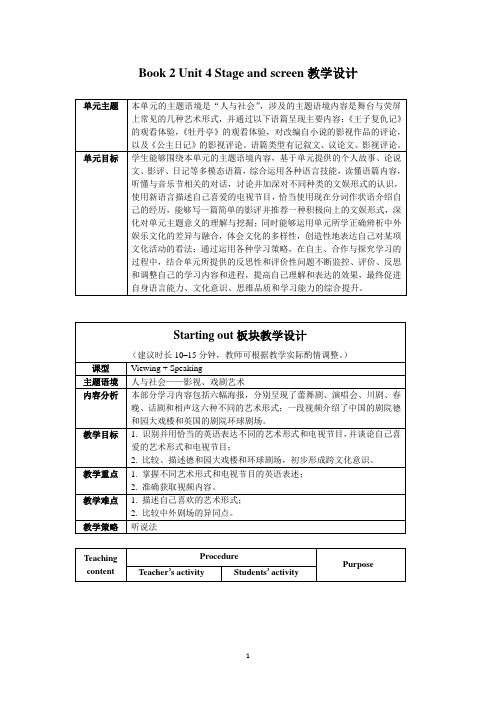
T asks Ss to read the passage quickly and find out what aspects of Peking Opera most impressed the author.
Ss read the passage quickly andfind out what aspects of Peking Opera most impressed the author.
1. What are the namesof the plays?
2.Besides language, what are other different aspects between them?
Ss look at the
pictures of two performances, talking about their differences and similarities, and answer the questions:
(建议时长40–45分钟,教师可根据教学实际酌情调整。)
课型
Reading + Speaking
主题语境
人与社会——影视、戏剧艺术
内容分析
本文是一篇记叙文,文章从西方人的视角描写观看中国版《哈姆雷特》——《王子复仇记》的感受,介绍中国京剧的艺术特点,展现京剧的艺术魅力。
教学目标
1.通过略读、精读读懂文章,概括文章主旨大意,获取细节信息;
教学难点
根据时间线索进行文本复述;思考京剧的艺术魅力。
教学策略
任务型教学法、P–W–P阅读模式
Teaching content
Procedure
Purpose
Teacher’s activity
新标准大学英语综合教程2_unit4_active_reading_2_[1]
![新标准大学英语综合教程2_unit4_active_reading_2_[1]](https://img.taocdn.com/s3/m/40f00cb8f121dd36a32d82d9.png)
Active reading 2:
Text organisation
Negative response Facts or figures Positive response Argument 1 the great tradition (Para 7) Argument 2
Decline trend (Para 3)
Active reading 2:
Jigsaw reading
Internet: turn to internet for use. (para2) instant monitoring for ads (para3)
Newspaper: cover price rising (para2, 3) readers with no interest in reading newspaper (para2,5)
More
Newspaper:
Pollution(para6)
Active reading 2:
Jigsaw reading
The future of Newspaper: new revenue stream lifestyle journalism (Para 8) locality (Para 8,9)
Teaching plan for period 1 (80 mins)
Tasks Time Objectives
Survey
Debate
5
15
Warmer
Predicting
Reading
20
Main idea
Text organization (group work) 20
Know the text organization
大学英语综合教程(第二版)unit4-PPT课件
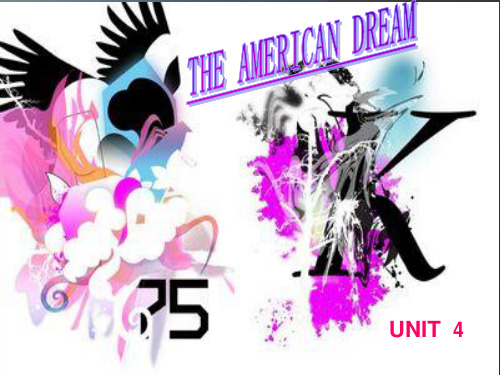
若说有什么东西是我无法忍受的话,那就是
不干净。
2)Anything to do with my finances is ma
wife’s province.
一切有关钱财的事-都由我妻子管。
6
Try, Try Again -------- T,H,Palmer
Try, a lesson you should heed, Try, Try again; If at first you don’t succeed, Try, Try again; Then your courage should appear, Foe, if you will persevere, You will conquer, never fear; Try, Try again.
capacity n.the ability to understand or do sth.能力,才能 例句: The capacity to respond to stimuli
skilled a.having skilled;needing skill熟练的,有技巧的;技术性的 例句:A skilled technician takes years to train.
ATM(自动出纳机).
balance
• 3)If you look out of the window on the left side of the
bus,you'll see that we're now____________the Tower of
London.
approaching
• 4)There'll certainly be some preblems,but nothing that
希望英语(第二版)综合教程unit4教案

教案任课班级制药111/112 2012年4月1日星期日(补周二)任课班级微生物111 2012年3月29日星期四教师姓名赵东平任课班级化工111/112 2012年3月28日星期三课题名称(教材章节)Unit Four AdvertisingNew words and Expressions & Speaking教学目的和要求 1. Help Ss learn the new words and expressions in this part.2. Remember some useful words and sentences about environment. Such as: agent, consumer, contain, convey, display, symbol, …教学重点 1.New words and expressions in this part教学难点 1. Explain and understand the meaning of new words and expressions教学过程与主要内容Step I Field work.Step II Read the new words and expressions and explain the key words and expressions.Step III Speaking part Task 1: Talk about the 4 images on P50Task2: Use the following sentence patterns and the words or phrases from Task 1 to talk about the pictures on Page 50 . A. Of all…, I like…best. B. The reason is that …Task 3: Work in pairs. Take turns asking your partner the following questions and make notes.What types of advertrisements do you often see or hear?What do you feel about TV advertisements that cut your favorite movie into pieces? How do you view the relationship between advertising and your life?Step IV Give Ss assignment today课外作业Homework Oral PracticePractice the new words and expressions阅读参考书目Hope English Book II Teacher’s Reference BookInternet resource课后体会教案任课班级制药111/112 2012年4月1日星期日(补周二)任课班级微生物111 2012年4月5日星期四教师姓名赵东平任课班级化工111/112 2012年3月29日星期三课题名称(教材章节)Unit Four AdvertisingReading A教学目的和要求Read and understand the meaning of Reading A.Master the sentence patterns from the Reading AFinish the exercises of Reading A教学重点Sentence pattern from Reading AExercises after Reading A教学难点Explanation of Reading A and exercises教学过程与主要内容Step I Revision Word dictationStep II. Reading A: Advertising Task 1: Give brief answers to the following questions. Then ask your partner about his/her answers and take notes.Task 2: Detailed Reading The teacher explain the language points in the text. Task 3: Ss can scan a passage to get specific ideas.Step III Do some after-reading exercises.Step IV Assignments课外作业Review and RememberPreview the grammar and listening part阅读参考书目Hope English Book II Teacher’s Reference BookListen to this Step by step课后体会教案任课班级制药111/112 2012年4月10日星期二任课班级微生物111 2012年4月 6日星期五教师姓名赵东平任课班级化工111/112 2012年4月 5日星期四课题名称(教材章节)Unit Four AdvertisingGrammar and Listening and Reading B教学目的和要求Know the special usage of subjunctive moodKnow the skills of listening教学重点 1. Help the Ss understand the listening materials in details.教学难点Explanation for reading materials in details教学过程与主要内容Step I .Revision 1.Ask some questions on Reading A.2.Ask the students to translate some sentences into English.Step II. Introduce the grammar: subjunctive moodDo Task 1 –Task 3 together and explainStep III. Listening.Do Task 1 –Task 6 together and explainStep IV. Explain Reading B.Step IV. HomeworkStudents’ Learning Card课外作业Homework Students’ Learning Card: ListeningReview the listening skills and preview .Reading C and Writing part阅读参考书目Hope English Book II Teacher’s Re ference BookInternet resource课后体会教案任课班级制药111/112 2012年4月10日星期二任课班级微生物111 2012年5月2 日星期三教师姓名赵东平任课班级化工111/112 2012年4月11日星期三课题名称(教材章节)Unit Four AdvertisingReading C and Writing and Presentation教学目的和要求Train the fast reading ability.Know the skill of writing a letter of thanks.教学重点 1. Help the Ss do the exercise.教学难点Explain the reading and writing materials in details.教学过程与主要内容Step I. Revision Translate some sentences into English. Step II. Reading CAllow 10 minutes for Ss to do the task, and then teacher checks the answer.Step III. Writing for General Purposes: Writing for general purposes—Task: development by exampleWriting for specific purpose—Task: letter of thanksStep IV. PresentationAsk each group gives a presentation in front of the class.Step V: Homework课外作业Presentation PartReview and preview.阅读参考书目Hope English Book II Teacher’s Reference BookInternet resource课后体会。
课件《综合英语(第二版)2》Unit4
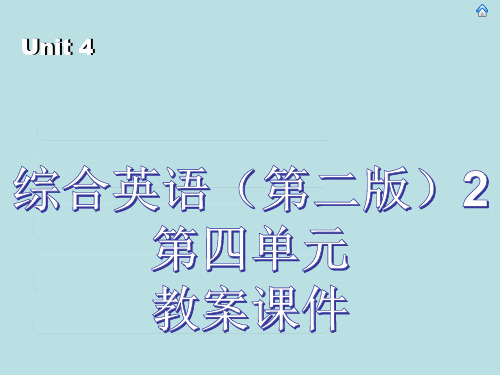
When things seem to be going badly, stop or slow down and think.
It briefly points out the immense significance of intercultural understanding.
Paragraph 4: The lack of an exact counterpart of the English word “homesickness” in other languages such as Italian, Portuguese, and German.
Paragraph 5: The problem of untranslatability which the early Bible translators encountered.
Second, it is important to assume that one’s efforts will not always be successful, and adjust one’s behavior appropriately.
Audiovisual supplement Cultural information
Text analysis Structural analysis
1. Which sentence is the thesis statement?
The last sentence of the 3rd paragraph: “Most fundamental is the profound relationship between language and culture that lies at the heart of society and one that we overlook at our peril.”
新编实用英语综合教程2Unit4HotelService教案
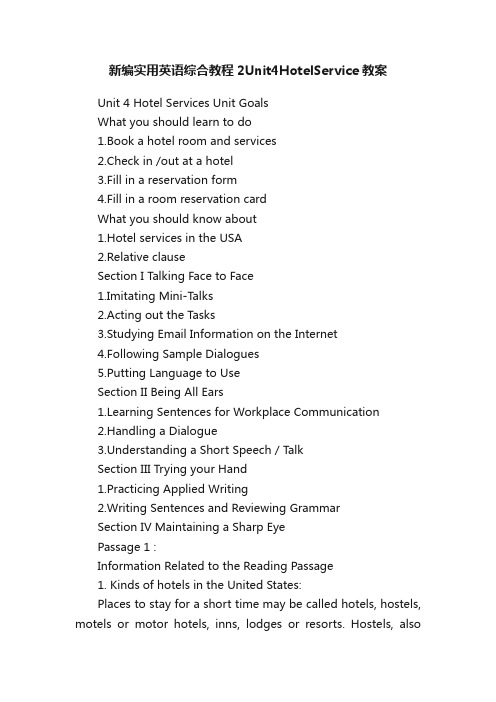
新编实用英语综合教程2Unit4HotelService教案Unit 4 Hotel Services Unit GoalsWhat you should learn to do1.Book a hotel room and services2.Check in /out at a hotel3.Fill in a reservation form4.Fill in a room reservation cardWhat you should know about1.Hotel services in the USA2.Relative clauseSection I Talking Face to Face1.Imitating Mini-Talks2.Acting out the Tasks3.Studying Email Information on the Internet4.Following Sample Dialogues5.Putting Language to UseSection II Being All Ears1.Learning Sentences for Workplace Communication2.Handling a Dialogue3.Understanding a Short Speech / TalkSection III Trying your Hand1.Practicing Applied Writing2.Writing Sentences and Reviewing GrammarSection IV Maintaining a Sharp EyePassage 1 :Information Related to the Reading Passage1. Kinds of hotels in the United States:Places to stay for a short time may be called hotels, hostels, motels or motor hotels, inns, lodges or resorts. Hostels, alsoreferred to as youth hostels, are often for students working away from home. Motels have plenty of parking space and are usually near a freeway or highway. Inns are usually like motels. Lodges and resorts, or resorts hotels, are in the mountains, on the coast, or near lakes.2. Kinds of beds:Beds go by many different names. Starting with the smallest, there are single, twin, double, queen and king size ones. “Long boys”are for exceptionally tall people. At some hotels, queen beds are the smallest size used, so a double room has two of them. Some hotels even offer their guests waterbeds. A rollaway can be moved into a room to sleep an extraperson. Hide-a-beds are sofas that fold out to make beds.Text Welcome to Climer LodgeMiami UniversityOxford, Ohio 45056Welcome to Climer Lodge. We are fortunate to have this beautiful facility to accommodate very special guests from Miami University. In our efforts to serve you, we ask that you note the following:●The resident manager lives in Room 129, near the lobby entrance, and may be reached by dialing 9-5226. Please contact the manager if you have any questions or needs after 5:00 P.M. on weekdays and throughout weekend stays.●On the lower level of Climer you will find an ice machine, a canned beverage machine, a lounge area and kitchenette where coffee and tea and a light continental breakfast are provided.●Lounge Hours:6:00 A.M. to 11:00 P.M. daily. It is a non-smoking atmosphere.●Recreation Center Hours:9:00 A.M. to 10:00 P.M., Sunday through Thursday. 9:00 A.M. to 11:00 P.M. onFriday and Saturday. No lifeguard is on duty in the swimming pool. Parents are required to be present at all times when children are in the pool. No children are allowed in the sauna.●Check-out time is 10:00 A.M. Upon departure, please leave the key in your room.Phone Instructions:●On-campus calls: Dial only the last 5 numbers. No need to dial the 52 prefix.●Local telephone calls: Dial 88, then the 7-digit off-campus number.●AT&T operator-assisted calls (collect, calling card, etc.) —dial 80, the area code(for all long distance calls), then the telephone number.To place an international call: Dial 8+011+Country Code+City Code+Number ●EMERGENCY PHONE NUMBER: PUBLIC SAFETY —911 (Police, Fire, Medical)Language Points1 Explanation of Difficult Sentences1. (Para. 1) We are fortunate to have this beautiful facility to accommodate very special guests of Miami University.Analysis: In this sentence the infinitive phrase to have this beautiful facility ...is used as an adverbial of reason, modifying are fortunate.Translation: 我们很荣幸为迈阿密大学尊贵的客人们提供优美的住宿条件。
《英语综合教程》第二册第四单元课文教学设计
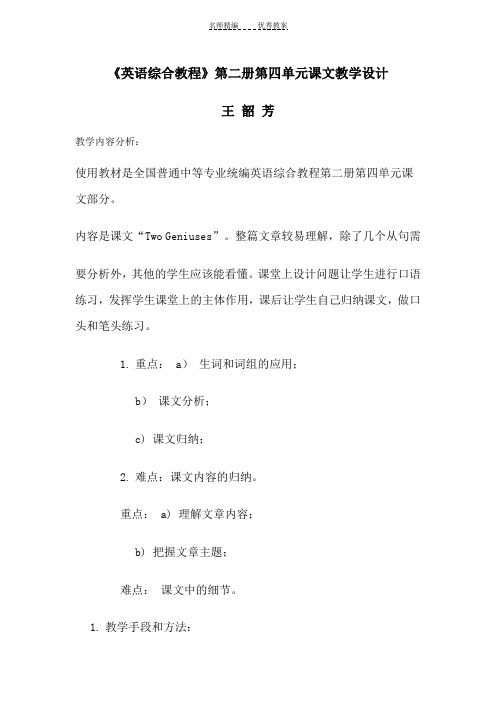
《英语综合教程》第二册第四单元课文教学设计王韶芳教学内容分析:使用教材是全国普通中等专业统编英语综合教程第二册第四单元课文部分。
内容是课文“Two Geniuses”。
整篇文章较易理解,除了几个从句需要分析外,其他的学生应该能看懂。
课堂上设计问题让学生进行口语练习,发挥学生课堂上的主体作用,课后让学生自己归纳课文,做口头和笔头练习。
1.重点: a)生词和词组的应用;b)课文分析;c) 课文归纳;2.难点:课文内容的归纳。
重点: a) 理解文章内容;b) 把握文章主题;难点:课文中的细节。
1.教学手段和方法:1.设计练习,让学生的听、说、读、写四环节都得到巩固,提高学生的实践能力。
2.教师着重对学生启发,解释清楚重点,难点,形成学生良好的思维习惯。
2.教学目标:1.认知目标3.教学时间:2课时精读(Ⅰ):课文“Two Geniuses”的生词,短语教学;课文的整体理解,难点、重点分析及归纳;4.教学媒体:录音机,录音带,多媒体5.教学评价:1.形成性评价:通过课堂提问,练习及课后作业所反馈的信息,及时调整教学进度和方法。
2.总结性评价:通过口头、笔头练习,推测教学目标的到达度。
教案:Two GeniusesPart One: Words Study1.Teaching contents: Two Geniuese2.Teaching key points: new words and expressions3.Teaching period: 30 minutes4.Teaching aids: recorder, tape5.Teaching procedureStep 1 Learning the new words and expressions (5 minutes) A.T: The passage tells us something very interesting about Albert Einstein Let’s learn the new words first.Teacher plays the tape. The students listen to the new words and read after the tape.Step 2 Presentation (20 minutes)A. Teacher explains some useful words and expressions.VocabularyRegard v. 视作,认作Regard…as 把…看作是She is regarded as the best teacher in the school.Please give my regards(问候) to your mother.Sense of humour 幽默感Sense of hearing 听觉Sense of sight 视觉Sense of smell 嗅觉Sense of taste 味觉Sense of touch 触觉Way n. 道路;方法;途径On one’s way toOn one’s way homeBy the wayIn the same wayKnow…by heart 熟悉,记住Learn…by heart 背诵.牢记The boy knows many popular songs by heart.Our teacher asked us to learn many expression by heart. Find out 发现,找到,查明Trouble n. 烦恼,麻烦Make trouble 带来麻烦/烦恼Ask for trouble 自讨苦吃Be in trouble 陷入困境Haven’t you make much trouble to me?Tell him not to go there, or he’ll get into trouble.3 Ending ( 5minutes)A .Oral: the whole class read the new words aloud. Teacher correct the pronunciationB. Assignment.a) finish vocabulary exercises.Textbook: on page 36Workbook: on page 23b) pre-read the passage.Part two: Text1.Teaching content: Two Geniuses2.Teaching key points:A. have a full understanding for the passage.B. be skillful at using the key grammatical structures and phrasesC. be able to retell the passage.3.Teaching period: 60 minutes4.Teaching aids: cassette recorder, tape,5.Teaching difficulties: some phrases6.Teaching procedure:Step 1 warming up ( 5 minutes)A. Greetings.B.T: Let’s go over the new words.Teacher plays the tape, the students listen.C. Ask the students to read the words aloud, then correct their pronunciation.Step 2 Presentation ( 55 minutes)A Teacher plays the tape. Students listen.B. Teacher begins to explain the passage in details, including grammatical structures, usage of the phrases and expressions and language points:1.He contributed a lot to the development of science.Contribute a lot to 对……作出许多贡献The development of science 科学的发展With the development of science and technology, the living conditions of people becomes better and better.Scientists have contributed a great deal to human progress.ed to do (过去) 常常be(/get) used to doing 习惯于……I used to stay in bed when I was young, but now I am usedto getting up early every morning.3. Einstein said, “Hans, I’m so tired that I don’t want to give my lecture tonight. But I can’t let my audience down, can I?”so+adj.…that 如此……以致It is raining so hard that we can’t go out.He speaks so fast that none of us can understand him.Such+n(或名词词组) ….that 如此……以致It is such a beautiful day that we can go outside for barbecue.Let…down 令……失望He didn’t work at all and let all of us down.I can’t let my audience down, can I?反意疑问句.前陈后否(逗号前是陈述句,逗号后是一般疑问句.)前肯后否,前否后肯,前后动词一致.The Silk Road was a trade route in ancient times, wasn’t it?The elephant use its trunk to feed it self, doesn’t it?3.Hans offered to take over for him.Take over for sb. 接任/接替某人Take over sth. 接管/接收某事物Who do you think will take over for you?Mr. Brown prefers to let his second son take over the business after his retiring.。
- 1、下载文档前请自行甄别文档内容的完整性,平台不提供额外的编辑、内容补充、找答案等附加服务。
- 2、"仅部分预览"的文档,不可在线预览部分如存在完整性等问题,可反馈申请退款(可完整预览的文档不适用该条件!)。
- 3、如文档侵犯您的权益,请联系客服反馈,我们会尽快为您处理(人工客服工作时间:9:00-18:30)。
《英语综合教程》第二册第四单元课文教学设计
王韶芳
教学内容分析:
使用教材是全国普通中等专业统编英语综合教程第二册第四单元课文部分。
内容是课文“Two Geniuses”。
整篇文章较易理解,除了几个从句需要分析外,其他的学生应该能看懂。
课堂上设计问题让学生进行口语练习,发挥学生课堂上的主体作用,课后让学生自己归纳课文,做口头和笔头练习。
1.重点: a)生词和词组的应用;
b)课文分析;
c) 课文归纳;
2.难点:课文内容的归纳。
重点: a) 理解文章内容;
b) 把握文章主题;
难点:课文中的细节。
1.教学手段和方法:
1.设计练习,让学生的听、说、读、写四环节都得到巩固,提高学生的实践能力。
2.教师着重对学生启发,解释清楚重点,难点,形成学生良好的思维习惯。
2.教学目标:
1.认知目标
3.教学时间:2课时
精读(Ⅰ):课文“Two Geniuses”的生词,短语教学;
课文的整体理解,难点、重点分析及归纳;
4.教学媒体:录音机,录音带,多媒体
5.教学评价:
1.形成性评价:通过课堂提问,练习及课后作业所反馈的信
息,及时调整教学进度和方法。
2.总结性评价:通过口头、笔头练习,推测教学目标的到达
度。
教案:
Two Geniuses
Part One: Words Study
1.Teaching contents: Two Geniuese
2.Teaching key points: new words and expressions
3.Teaching period: 30 minutes
4.Teaching aids: recorder, tape
5.Teaching procedure
Step 1 Learning the new words and expressions (5 minutes) A.T: The passage tells us something very interesting about Albert Einstein Let’s learn the new words first.
Teacher plays the tape. The students listen to the new words and read after the tape.
Step 2 Presentation (20 minutes)
A. Teacher explains some useful words and expressions.
Vocabulary
Regard v. 视作,认作
Regard…as 把…看作是
She is regarded as the best teacher in the school.
Please give my regards(问候) to your mother.
Sense of humour 幽默感
Sense of hearing 听觉
Sense of sight 视觉
Sense of smell 嗅觉
Sense of taste 味觉
Sense of touch 触觉
Way n. 道路;方法;途径
On one’s way to
On one’s way home
By the way
In the same way
Know…by heart 熟悉,记住
Learn…by heart 背诵.牢记
The boy knows many popular songs by heart.
Our teacher asked us to learn many expression by heart. Find out 发现,找到,查明
Trouble n. 烦恼,麻烦
Make trouble 带来麻烦/烦恼
Ask for trouble 自讨苦吃
Be in trouble 陷入困境
Haven’t you make much trouble to me?
Tell him not to go there, or he’ll get into trouble.
3 Ending ( 5minutes)
A .Oral: the whole class read the new words aloud. Teacher correct the pronunciation
B. Assignment.
a) finish vocabulary exercises.
Textbook: on page 36
Workbook: on page 23
b) pre-read the passage.
Part two: Text
1.Teaching content: Two Geniuses
2.Teaching key points:
A. have a full understanding for the passage.
B. be skillful at using the key grammatical structures and phrases
C. be able to retell the passage.
3.Teaching period: 60 minutes
4.Teaching aids: cassette recorder, tape,
5.Teaching difficulties: some phrases
6.Teaching procedure:
Step 1 warming up ( 5 minutes)
A. Greetings.
B.T: Let’s go over the new words.
Teacher plays the tape, the students listen.
C. Ask the students to read the words aloud, then correct their pronunciation.
Step 2 Presentation ( 55 minutes)
A Teacher plays the tape. Students listen.
B. Teacher begins to explain the passage in details, including grammatical structures, usage of the phrases and expressions and language points:
1.He contributed a lot to the development of science.
Contribute a lot to 对……作出许多贡献
The development of science 科学的发展
With the development of science and technology, the living conditions of people becomes better and better.
Scientists have contributed a great deal to human progress.
ed to do (过去) 常常
be(/get) used to doing 习惯于……
I used to stay in bed when I was young, but now I am used
to getting up early every morning.
3. Einstein said, “Hans, I’m so tired that I don’t want to give my lecture tonight. But I can’t let my audience down, can I?”
so+adj.…that 如此……以致
It is raining so hard that we can’t go out.
He speaks so fast that none of us can understand him.
Such+n(或名词词组) ….that 如此……以致
It is such a beautiful day that we can go outside for barbecue.
Let…down 令……失望
He didn’t work at all and let all of us down.
I can’t let my audience down, can I?
反意疑问句.
前陈后否(逗号前是陈述句,逗号后是一般疑问句.)
前肯后否,前否后肯,前后动词一致.
The Silk Road was a trade route in ancient times, wasn’t it?
The elephant use its trunk to feed it self, doesn’t it?
3.Hans offered to take over for him.
Take over for sb. 接任/接替某人
Take over sth. 接管/接收某事物
Who do you think will take over for you?
Mr. Brown prefers to let his second son take over the business after his retiring.。
